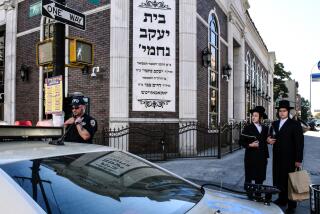Gregory Rodriguez: Secularism gains ground
Woohoo! Secularism has arrived. That was one reaction to the news that Pitzer College in Claremont is launching a secular studies department.
“Well, it’s about time!” wrote an eager academic in the Chronicle of Higher Education. The editor of CNN’s Belief blog didn’t know “whether to be surprised that it happened or surprised that it took so long.”
The blog at the conservative journal First Things, however, was neither surprised nor celebratory. It snarkily quipped that “college students in America have been majoring in secularism for decades.”
As with so many issues in this country, in the cultural battle between those who don’t think secularism is a dirty word and those who do, it’s never quite clear which side is David and which is Goliath. Both sides, however, are quick to play the victim card.
Over the last few years, conservative Christians have groused about what they see as anti-religious discrimination, a problem they annually announce by attacking the “war on Christmas.” For their part, some atheists have yelped wildly about the deep prejudice they say they face.
Just last month, Phil Zuckerman, the Pitzer College sociologist who proposed that the school establish a secular studies department, co-wrote an opinion piece in the Washington Post decrying what he saw as “stunning anti-atheist discrimination” that renders “nonbelievers intrinsically suspect and second-class citizens.”
The defensively activist tone of that article raises the question of whether studying secularism at Pitzer will be self-scrutiny or self-congratulation. If it doesn’t watch out, Pitzer’s secular studies department could very well find itself in the academic ghetto of minority pride and grievance. Do we really need more of that?
I don’t think so. Although secularists, a group that includes but is not exclusive to atheists, are a minority in the country, their voices nonetheless dominate contemporary college campuses. Notre Dame sociologist Christian Smith writes that in an academic revolution in the late 19th century, scientific objectivity became the paradigm for the pursuit of all knowledge, which “redefined religious concerns and perspectives as irrelevant if not detrimental to the mission of higher education.”
This anti-religious bias led to a profound misjudgment on the part of many 20th century American intellectuals. Academia was pretty much convinced that the rest of the world would follow it into secularism. Sociologists promulgated something called the secularization thesis, which held that modernization seamlessly and absolutely leads to a decline in religious influence. But this particular article of faith left some scholars ill-prepared to comprehend the resurgent role religion has played in public in recent years, from the rise of Christian evangelicalism in U.S. politics to Muslim fundamentalism abroad.
Still, the theory wasn’t completely wrong. Secularism continues to gain ground. Even as Americans claim to believe in God in astronomically high numbers compared with other parts of the Western world, from 1990 to 2008, the number Americans who subscribe to no religion at all more than doubled, making them the fastest-growing “religious group” in the United States.
All of which means that if done well, secular studies are worth having: there’s something there to contemplate. Nor does the study of secularism have to be at odds with religion on campus. As a student at UC Berkeley long ago, I took a course in anti-religious thought, the most strident form of secularism. It didn’t make me an unbeliever, but it did explain how the anti-religious thinking of Freud and Marx, for instance, insinuated itself into the Western intellectual tradition. Perhaps more than any other course I took in college, that class taught me the fundamental lesson that real differences exist between people that go even deeper than race, ethnicity or class.
University of Tennessee intellectual historian Wilfred McClay argues that the interplay between faith and nonbelief is basic to the way America works. In his estimation, we require ideas “to pass through a bicameral body politic, both religious and secular,” and the combination of the two helped defeat slavery, achieve women’s suffrage and push for civil rights legislation.
The United States is arguably the most religious and the most secular country in the world. You may find yourself on one side or the other of this dichotomy, but you won’t really understand one side of the equation without comprehending the other. Secularism may or may not have come of age, but it merits a closer, more critical look.
More to Read
A cure for the common opinion
Get thought-provoking perspectives with our weekly newsletter.
You may occasionally receive promotional content from the Los Angeles Times.










